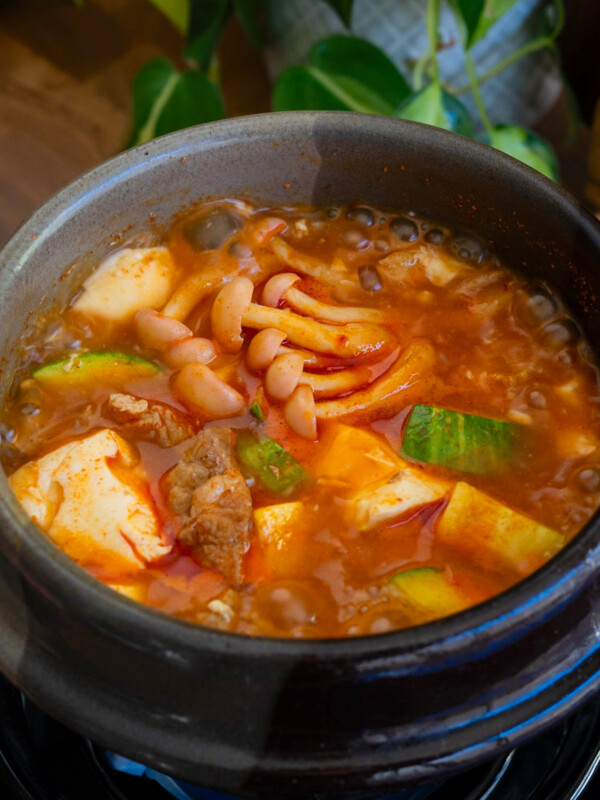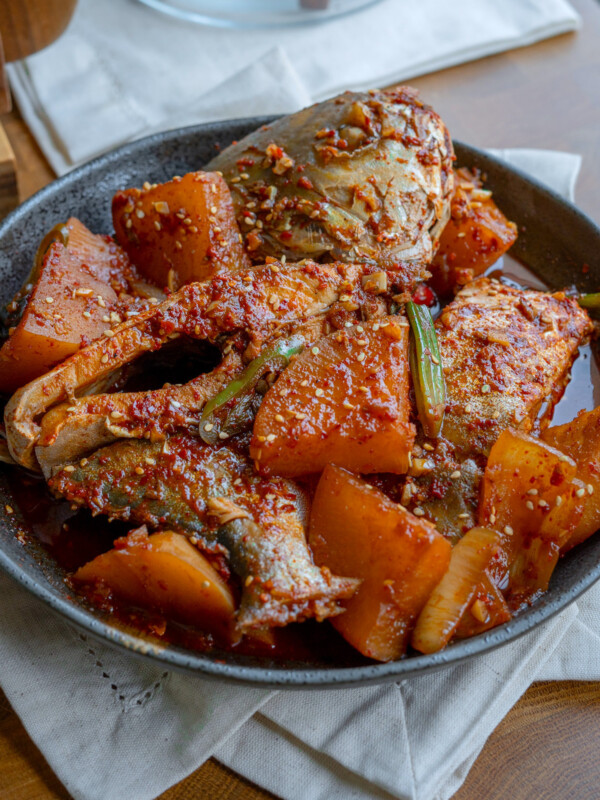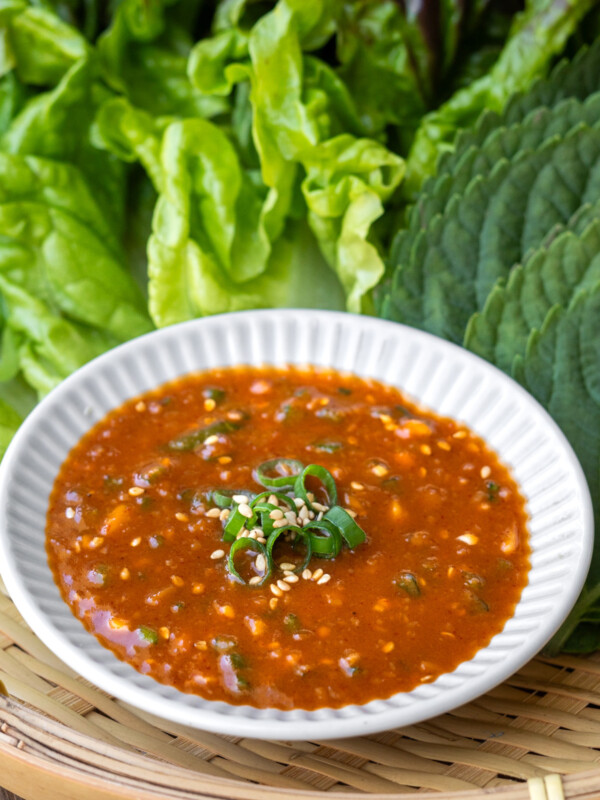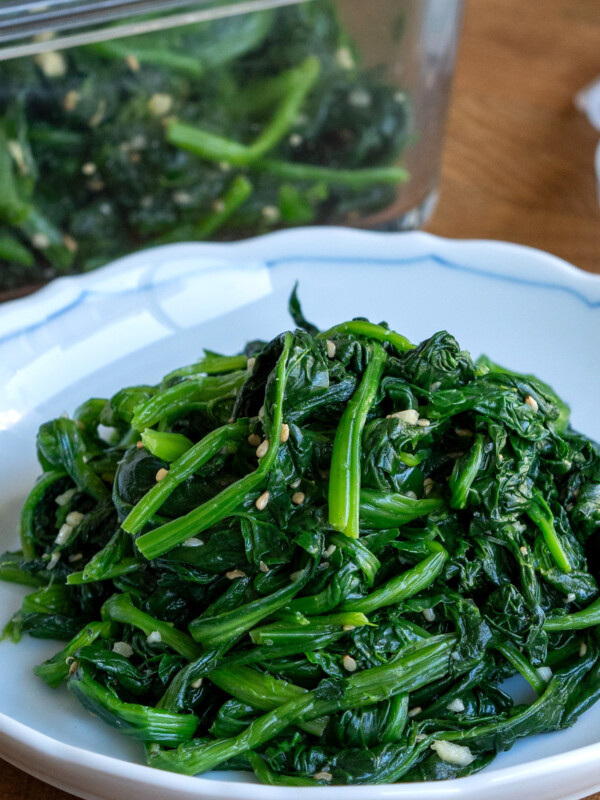This post may contain affiliate links. I only recommend products or services that I personally use or trust, promise!

Have some old, sour kimchi you need to get rid of? Don’t throw it away- it’s perfect for making kimchi jjigae!
This iconic Korean stew is more than just a dish- it’s the heart & soul of Korean home cooking, where bold flavors come together in the most comforting way.
It’s SUPER easy to make, but there is one key factor in making the best kimchi jjigae, which I will discuss later in this post.
What is Kimchi Jjigae?
Kimchi Jjigae is a traditional Korean stew known for its robust and spicy flavors. It is a staple in Korean cuisine and is often considered a comfort food. The main ingredients include well-fermented kimchi, tender pork, anchovy stock, and tofu.
It’s a popular choice for family meals and gatherings, and its preparation can vary from region to region or even from one household to another. The stew is often served piping hot and is enjoyed with a bowl of rice.

Why you’ll love this recipe
- It’s so easy! You don’t need that many ingredients, and it can be ready in 30 minutes.
- Maintain your gut health! One small bowl of this recipe contains more than enough to meet the recommended daily dose of probiotics. Kimchi also has antioxidant and anti-inflammatory properties.
- It can be prepped and stored in the refrigerator for a few days and reheated for quick meals.
- It’s the one of BEST ways to get rid of your old, sour kimchi. The other dish I love making with well-fermented kimchi is kimchi jeon (kimchi pancake).

Ingredients
- Kimchi- the secret to good kimchi jjigae is all in the kimchi. It has to be well-fermented (old & sour), and it has to be really, REALLY good. I do not have a recipe for kimchi yet, but I am working on one! I will update this when I do.
- Kimchi brine- again, it must be well-fermented. It is difficult to make good kimchi jjigae without a good amount of brine, so keep this in mind when purchasing or making your own kimchi.
- Pork belly- pork and kimchi go together, they are so delicious! However, you can opt for spam, beef, or canned tuna instead. You can also make it without any meat if you prefer!
- Anchovy stock- I use anchovy tablets and dissolve them in hot water. You can also use anchovy dashi bags. If you prefer to make it from scratch, you just need dried anchovies & dried kelp boiled in water for about 20 minutes.
- Tofu- firm tofu cut into small pieces. This is traditionally added to kimchi jjigae, but in my opinion it’s an optional ingredient. My husband loves tofu so I always add it, but if I’m making it just for myself, I usually don’t add it.
- Gochugaru- this is optional- mostly for color, but if your kimchi is lacking in flavor then it can help a bit.
- Sugar- helps to balance the flavors, especially if your kimchi is overly sour.
- Garlic & green onion– these are the only veggies you need to chop!

About the kimchi
So here’s the deal. Kimchi jjigae is extremely easy to make, but it will only ever be as good as your kimchi! The key to making delicious kimchi jjigae is all in the kimchi you use.
It should be fully fermented. The older and more sour, the better. You also need lots of kimchi brine.
If you try to make kimchi jjigae with fresh or un-fermented kimchi, it is not going to be good. Trust me on this!
How to tell if your kimchi is well-fermented
If you’re not that familiar with the stages of fermentation in kimchi, here are some signs to tell if it is fermented enough:
- It smells and tastes sour. Well-fermented kimchi is very sour, almost too sour for eating uncooked. Once kimchi gets to this stage, it is best to use it for cooking.
- It looks almost translucent. When kimchi is very sour and old, it may keep its crunchy texture but it will appear more wilted, and almost look translucent. Fresh kimchi by comparison looks much more opaque, especially the white crunchy parts of the cabbage.

More easy soup recipes
If you like this recipe, try some of my other easy soup recipes on the blog!

Kimchi Jjigae (Kimchi Stew)
Ingredients
- 2 cups chopped kimchi, well-fermented
- 1 tbsp minced garlic
- 1/2 lb pork belly, or beef, spam, canned tuna
- 1/3 cup kimchi brine, well-fermented
- 3 cups anchovy stock
- 1 tbsp gochugaru, Korean red pepper flakes
- 1 tsp sugar
- salt to taste
- 1/2 package firm tofu , cut into squares
- 2 green onions, chopped , whites & greens separated
Instructions
- Chop kimchi into bite sized pieces

- Chop the green onions and separate the greens from the whites. The greens will be used for garnish while the whites will be cooked into the soup.

- Prepare your anchovy stock. For ease and convenience, I use anchovy tablets dissolved in hot water. You may also use dashi bags, or make it from scratch by boiling water with dried anchovies and dried kelp for 20 minutes.

- Add some neutral oil to a pot over medium high heat, then add the kimchi and garlic. Stir fry for a couple minutes.

- Next add the pork belly and continue to stir fry for another couple of minutes.

- Add the kimchi brine and just 1 cup of the anchovy stock. Mix to combine, then reduce the heat to medium and cover for 5 minutes.

- After 5 minutes add the rest of the anchovy stock, sugar, and gochugaru. Taste the soup and add salt to taste (I added a small pinch). Cover for 10 minutes.

- Add the tofu and cover for another 5 minutes.

- Garnish with green onions and thats it!Optional: drizzle a tiny bit of sesame oil if desired. I recommend 1/4 tsp (sesame oil is very strong in flavor, careful not to add too much).

Nutrition information is automatically calculated, so should only be used as an approximation.















I love kimchi jiggae but also love how detailed you are with your recipes!
Delicious recipe and so easy to make! Great way to use up your leftover kimchi
Had old, sour kimchi in my fridge and didn’t know what to do with it. So glad I found this recipe. So simple yet so good! Thank you for sharing 🫶🏼
Closest to the way my mom use to make it. Love this!
Best comfort food & super easy to make!! :p
Love this recipe. Tastes like the one my Mom use to make when I was growing up!
My son loves this recipe. It’s a winner for sure.
One of my fav recipes from you! Tried and truly so easy to make!
This stew has been in my weekly rotation this winter and cannot be any easier to make with lots of flavor!
Best recipe out there! I’ve tried multiple recieps and by far the most delicious one!
Best way to use up old kimchi
Would always go to BCD and Kaju back home, this was and still is the most comforting meal. Since I moved, I couldn’t find a similar restaurant so now I make it at home! Delicious, comforting, and nostalgic.